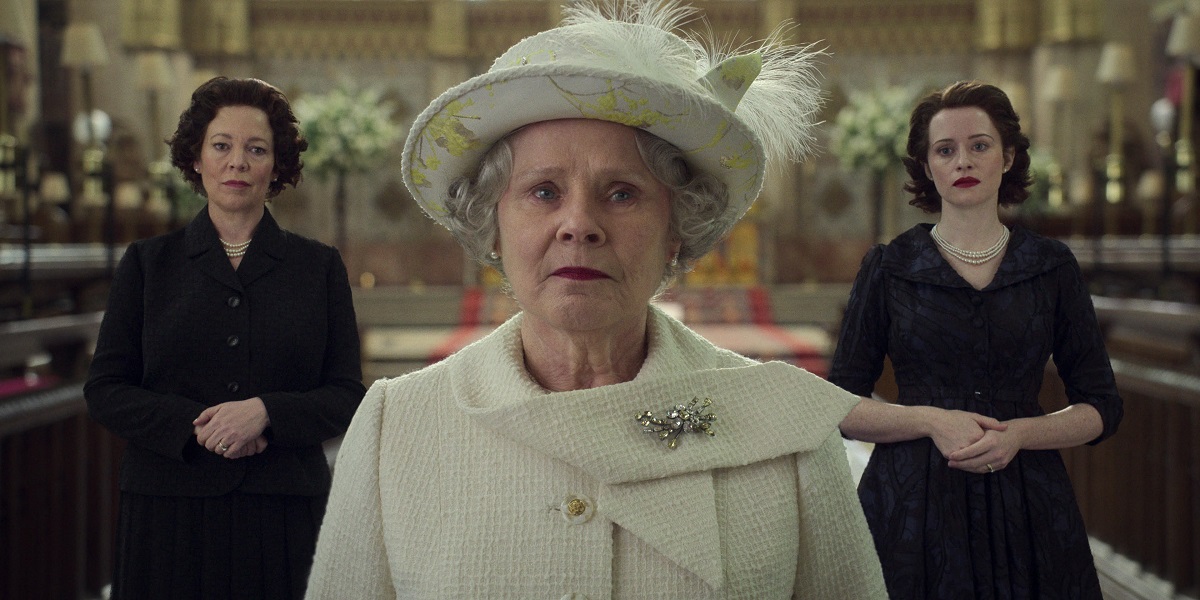Why Stories Like ‘The Crown’ Resonate Even Though We, Like Lorde, Will Never Be Royals

When the final episodes of Netflix’s The Crown premiered earlier this month, I loved how the show handled its ending. The final hours with Imelda Staunton’s Elizabeth Windsor clarified why, despite its lofty and not-uncontroversial central family, the show was ultimately (and surprisingly) relatable.
A finale fit for a Queen
***Spoilers for the final season of The Crown ahead***
The final episodes of The Crown addressed and paid respect to the end of Queen Elizabeth II’s life without “covering it” the way the show depicted the other major events in the life of the British royals through 2005.
In its touching final episode, “Sleep, Dearie, Sleep,” the Queen is asked to start planning her funeral, codenamed “Operation London Bridge.” Planning for her death prompts her to look back on her life and she wrestles with whether or not to abdicate the throne and live the rest of her life as the “woman she gave up” to be Queen.
She considers this as she gives Prince Charles (Dominic West) and Camilla Parker Bowles (Olivia Williams) permission to get engaged and they prepare for their wedding. As Charles seems to have truly grown into his role as the Heir Apparent she hopes that, in passing him the torch, his new perspective will reinvigorate a public seemingly detached from the monarchy, and from her.
As the Queen literally debates with herself (in the forms of Olivia Coleman and Claire Foy, reprising their roles as Middle-Aged and Young Elizabeth, respectively) about announcing her abdication in a speech at Charles and Camilla’s wedding, she plans the details of her funeral.
She summons the Piper to the Sovereign (the guy who plays the bagpipes every morning), both to express gratitude for his playing, which she genuinely enjoys, and to ask his opinion about funeral music, asking if he has a favorite piece. He recommends a beautiful song called “Sleep, Dearie, Sleep,” which he plays for her as tears well in her eyes.
The show ends with The Queen, flanked by her past selves, walking down the long aisle of an empty St. George’s Chapel. As she steps through the front door, white light surrounds her and the series ends.
A show about getting older, finding one’s purpose, and securing one’s legacy
Whatever one thinks about monarchy or the aristocracy, The Crown was also the story of a young woman who at 25, when most young people are only starting to figure out who they are and who they want to be, had her father’s job thrust upon her before she was ready, because he died.
You don’t have to be a monarch to relate to being a woman in a male-dominated field, going into the family business, or feeling the pressure of family and duty when making major life decisions. You also don’t have to be a monarch to understand the experience of getting older, realizing that you have more time behind you than in front of you, and hoping that whatever you’ve contributed to the world has made a difference and has provided for those who come after you.
This was what stood out to me about The Crown, more than the pop culture references or the dramatization of news items and scandals. The show used the device of a protagonist in an inherited job to take viewers through one woman’s entire life, allowing them to explore all the major milestones of human experience: coming-of-age, marriage, parenthood, grief, work, familial responsibility, civic duty, generational trauma, and legacy.
Why shows like The Crown resonate
Human beings have been telling the stories of kings and queens, famous heroes, and mythological figures for as long as storytelling has been a thing. And watching this final season of The Crown, it occurred to me that biopics (like Oppenheimer), series based on real people (like The Crown), or heightened stories based on the experiences of classes we will never join (like Succession) serve the same purpose that sci-fi, fantasy, or horror do.
Heightened circumstances allow us to look at difficult human experiences and emotions in a less painful way. These stories are less about representing their subjects well and more about allowing us to see our humanity reflected back at us with some distance so we can process it.
This isn’t to say that more mundane stories don’t have value or purpose. Of course they do. Sometimes, a film or show that makes us feel seen and represented hurts so good, allowing for a different kind of understanding and exploration. But while we can certainly say, “Why should we keep retelling the stories of rich or famous people,” they actually do serve a purpose—as inspiration, illumination, or as cautionary tales. Usually all three.
If you remove the money, power, and influence, stories like The Crown are about finding one’s purpose, processing trauma, and wanting to leave behind a good legacy when we die. They’re about the things we all think about no matter how much, or how little, money or power we have.
(featured image: Justin Downing/Netflix)
Have a tip we should know? tips@themarysue.com